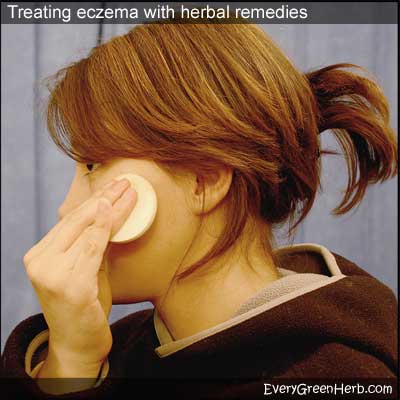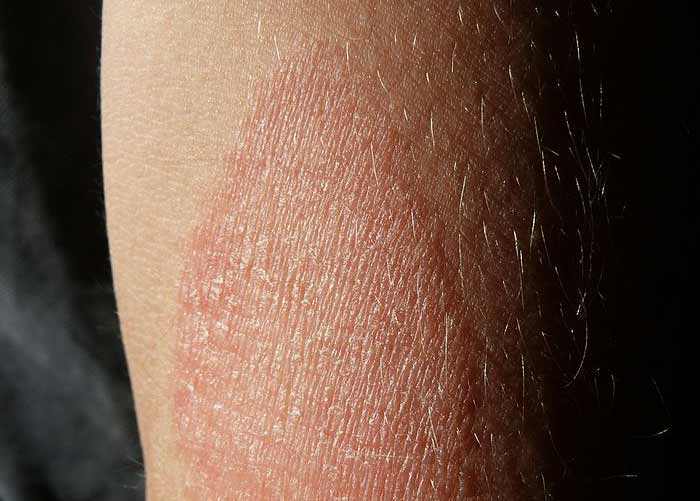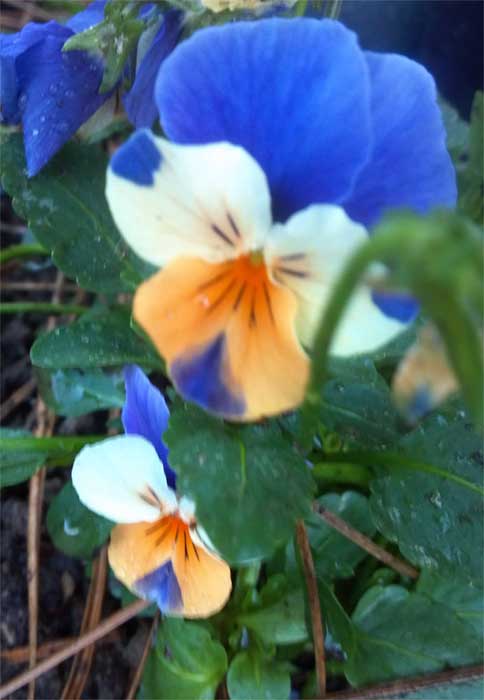Eczema herbs
Treating eczema and skin rash with natural remedies

Herbs help heal eczema.
There are many herbs that help eczema, rashes, and itchy skin although it may take time to find the best one for each individual. Milk thistle seed, myrrh, licorice root extract, ginger, borage, and comfrey are some herbs known for helping eczema.
Stinging nettle or yellowroot tea may also bring soothing relief.
Soak a cloth in warm tea and apply to rash for 20 minutes five times a day. Stinging nettle and yellowroot contain substances that fight bacteria, redness, and inflammation.
What is eczema?
Eczema is an itchy, inflammatory skin rash usually found on the elbows, knees, wrists, neck, and scalp. Unlike cases of poison oak and poison ivy, the cause is unknown.
Sometimes crusts and raw patches appear. In severe cases of eczema, there is oozing and even bleeding.
Sometimes eczema and itchy skin rash can be caused by allergic reactions or stress. If so, relaxing and getting stress under control is the best remedy.

Dairy products sometimes cause eczema.
Avoid rich dairy products. Cutting back on dairy foods may bring quick relief. Good diet with plenty of organic vegetables and green drinks with digestive enzymes can sometimes heal the lesions and stop eczema outbreaks.
Try using burdock to fight eczema.
Burdock leaf is especially good for clearing up scaly skin. Combine with yellow dock, cleavers, heartsease (viola), chickweed, and red clover for best results.
This tea should be consumed three times a day and applied often to the affected areas of skin.
Apply herbal ointment to crusty areas.
Evening primrose or chickweed ointment also helps heal lesions and crusty areas. Apply often throughout the day, after baths, and at bedtime.
Chickweed also makes excellent infused oil for use in herbal bath or massage.

Heartsease can heal and sooth eczema.
Heartsease (also known as viola tri-color) can be beneficial in the treatment of eczema and other skin problems. Make tea from aerial parts (flowers, leaves, and stems) and drink one or two cups a day for a couple of weeks.
Also use heartsease in ointments and washes for external applications.
Use slippery elm as an herbal remedy to treat eczema.
Slippery elm is considered a good herbal remedy for eczema. Make an herbal paste from dried, powdered leaf and a little water. Apply and leave on for one hour. Rinse and gently pat dry three times a day.
Try essential oils when treating eczema.
Some essential oils are well suited for treating eczema. Blend almond or olive oil with a few drops of rose essential oil, geranium essential oil, juniper essential oil, or lavender essential oil.
Never blend multiple essential oils without testing for reaction on normal skin. Remember that essential oils are powerful substances that must be used with care.
Do not get essential oils in the eyes.
Calendula can help heal eczema.
Calendula is another natural remedy for eczema and is an excellent moisturizer. Apply as ointment or lotion.
Other home remedies for treating eczema
Many times tea tree essential oil and witch hazel can help. Some herbalists recommend jojoba oil and morning sunshine.
Elder leaves and aloe vera are also known to be good for healing eczema. Other remedies include bathing in baking soda, adding cranberry juice to the diet, and applications of zinc ointment.
Try adding turmeric to the diet.
Turmeric may also be used in the treatment of eczema. Take capsules daily for six weeks and condition should improve.
Children and eczema
For a gentle remedy for children and the elderly, combine dry oatmeal (or powdered oat straw) with chamomile tea to make a thick paste and apply often for two or three days. A bandage may be used to keep paste from rubbing off.
Scientific studies
Eczema, also known as atopic dermatitis, comes and goes without rhyme or reason.
Studies show that environment plays a big role in outbreaks. There are fewer cases of eczema in areas with higher humidity, more sunshine, and higher temperatures. There is also a relationship between skin rash and central heating. Dry heat in the winter is not good for any type of skin!
Fabric choice can also make a difference.
Wool sometimes causes eczema to worsen. If you suffer with eczema, choose clothing and bedding made from cotton, linen, and silk.
Healing waters
The healing powers of the Dead Sea are known throughout Israel and beyond. Studies show that minerals in the water, along with sunshine, promote skin healing.
For best results, patients should swim for 20 minutes two times a day while gradually increasing sun exposure. This treatment is also proven to help heal psoriasis.
For people that are not able to travel to Israel, there are healing waters and springs in other parts of the world. A note of caution, some minerals can cause eczema, so don't assume all mineral waters are healing.
Everyone is different.
Lotions, oils, and moisturizers are also good when treating eczema. Since everyone is different, what might help one person, might not help the next. It is a process to find something that works.
Sunflower seed oil, with its anti-inflammatory properties is a good oil to try. Virgin coconut oil is also a good oil for treating skin rash. Evening primrose oil, black currant seed oil, and borage oil contain fatty acids that may bring fast relief from eczema and itching.
Pesky triggers
Some things can trigger eczema, especially air born proteins produced by dust mites and cockroaches. Special pillow and mattress covers can help reduce exposure.
Acupuncture and alternative medicines
Acupuncture is also an excellent way to treat eczema and problem skin. Alternative medicines show great promise in treating the skin and keeping it healthy.
*Calendula belongs to the same family as daisies, chrysanthemums, and ragweed. In cases of allergic reaction, discontinue use. Calendula may affect conception when taken by either man or woman, so avoid when trying to get pregnant. Do not use calendula in excessive amounts when pregnant or nursing.
Only use one remedy at a time and give it a chance to work. Discontinue use if irritation develops.
Always consult with a healthcare professional before using any herbal remedy especially during pregnancy, while nursing, or while taking prescription medications.
More information from Every Green Herb
Read about herbs for other skin problems like dryness
Read about herbs for hives
Read about treating acne with natural remedies
Read about natural treatments for warts, skin tags, and moles
Read about herbs for aging skin and wrinkles
Sources:
https://www.ncbi.nlm.nih.gov/pmc/articles/PMC4518179/
Blessings to you and yours!
Thanks so much for reading my blog. Jan.

*Note - the information on this website has not been evaluated by the Food and Drug Administration.
© 2005-2024 website design and content by Janice Boling